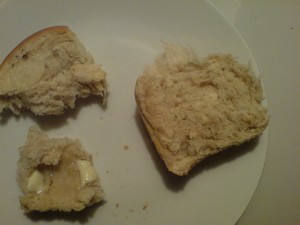
Varme hveder. (Photo by Jane Mejdahl on Flickr, shared through Creative Commons: http://www.flickr.com/photos/gullig/483009991/in/photolist-4KwNxT-JFy3t-nm6pr8)
Pray! It’s Store bededag [stoah BETHehdaay] (Great Prayer Day). Each year, on the fourth Friday after påsken (Easter), people in Denmark have a nice day off. Although this holiday is a Danish speciality (it only exists here), I know no people who take the praying part seriously and actually do spend the day sending wishes to Gud [gooth]… Instead they – you guessed it! – hygger sig (have a good time). Special buns called varme hveder (”hot wheaties”) are eaten on this day, fresh from the ovn (oven), so crisp and hot that smørret smelter (the butter is melting).
Last weekend, the world tuned to København as the Danish capital was hosting Melodi Grand Prix [melodEE grannPREE], or Eurovision Song Contest, as it is also known. Singers from several European countries strove to sway the judges and win the hearts of the Europeans. The Austrian drag queen Conchita Wurst, known by Danish papers as den skæggede dame (the bearded lady), trak det længste strå (drew the longest straw = won) with his/her song Rise Like a Phoenix. Many experts saw this as a victory for sexual minorities.

Basim
The talk of the town in Denmark, however, hasn’t been Conchita Wurst at all, but the Danes’ own contestant:
Basim. As strange as it may sound, many Danes still have a hard time accepting people with foreign roots as ”proper Danes”. Basim’s parents came to Denmark from Morocco, and some people just keep banging on about the guy’s ethnicity. In March, Basim hit the nail on its head in an
interview:
Har du som indvandrer oplevet racisme i Danmark? a reader of the paper Information asked him. ”Have you, as an immigrant, experienced any racism in Denmark?” Basim’s answer went like a lightning through all the social networks:
Jeg er ikke indvandrer. Jeg har ikke indvandret til noget land.
(I’m not an immigrant. I haven’t immigrated to any country.)






